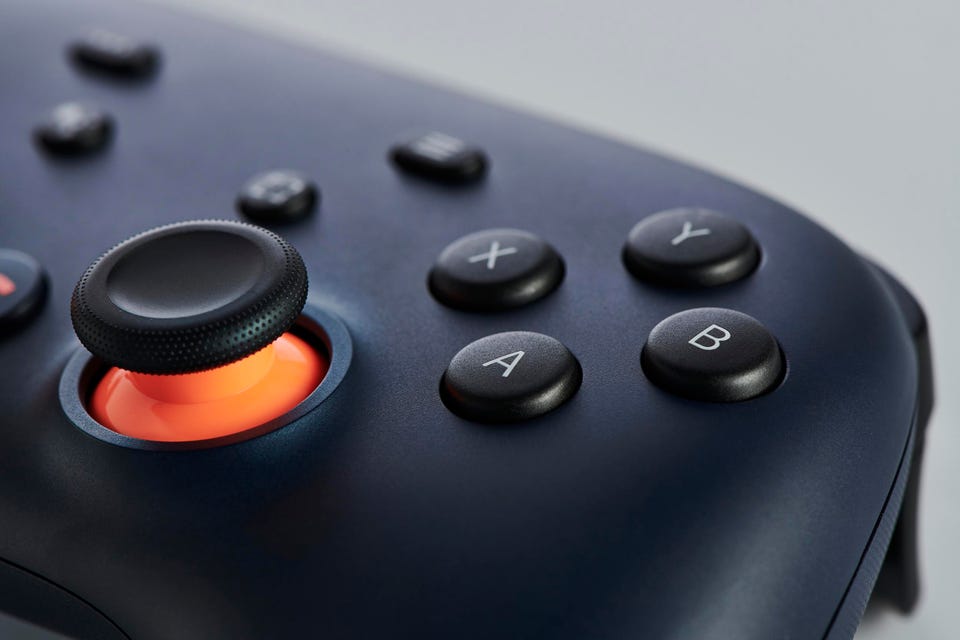Games The Stadia Was Always Going To Fail, Because Google Never Took Video Games Seriously Ollie Barder Contributor Opinions expressed by Forbes Contributors are their own. I cover gaming in Japan as well as the pop-culture here. Following New! Follow this author to stay notified about their latest stories.
Got it! Oct 4, 2022, 05:14am EDT | New! Click on the conversation bubble to join the conversation Got it! Share to Facebook Share to Twitter Share to Linkedin Close-up detail of the A B X Y buttons and analogue control stick on a Google Stadia video game . . .
[+] controller with a Night Blue finish, taken on November 27, 2019. (Photo by Olly Curtis/Future Publishing via Getty Images) Future Publishing via Getty Images Back in 2009, video games were introduced to cloud gaming with OnLive . Where gamers could play games remotely and stream it.
Naturally, things like input lag killed the service , so why did Google make the same mistake with Stadia ? Obviously, OnLive couldn’t compete with Google’s immense and distributed online infrastructure but even with all that, input lag was still an issue for Stadia . So why make the same mistake nearly a decade later? This goes back to how American companies view video games and specifically the culture built around it. The game industry crash of the early 80s set the tone for business people in the US; that gaming was an ephemeral and almost cursory endeavor.
Why take something seriously that you have to build up over time, when the industry looks like a fleeting boom/bust undertaking. However, they misread the market and assumed what happened once in the US would happen again all over the world. This left an opening for Japanese companies to move in and build something up gradually.
This is important as this longterm Japanese approach is key to understanding how the modern games industry works. MORE FOR YOU Patrick Byrne Of Overstock Fame Says He Was Involved In Monthslong Effort To Overturn 2020 Election Three Men Share The 2022 Nobel Prize In Physics For Discoveries In Quantum Mechanics Zero-Trust Strategies: Delivering On The Promises Of Progress In that, Microsoft has tried, and is still trying, to take on the gaming industry through finding varying angles of attack. The reality is that in order to beat the incumbent gaming industry leaders, you need to conquer them where they thrive.
That means you need to build up a realistic hardware competitor with dedicated games over a long period of time, like Japanese companies have done for decades. Due to the fact that Nintendo and Sony have a massive head start, it means that any financial outlay invested by a competitor will need to exceed that overall total from the outset. Naturally, that is a daunting prospect for any company, even Google.
So taking a different angle, such as cloud gaming, likely appears more reasonable but it also means that you hedging your bets and are not in it to win it. Google wanted to break into gaming without having to actually compete. On the surface that may look like disruption, but viewing the games industry purely through the lens of technology is always going to end badly.
Instead, Google should have hunkered down and made a proper gaming console with games that would be played directly on it, and not streamed from elsewhere. However, that would have been a long and very hard slog, as well as being hugely expensive, which they didn’t have the appetite for. In short, Google never really cared for games in the same way companies like Nintendo and Sony do, and were unwilling to actually mount a proper offense against their competition.
With that kind of defeatist approach, the Stadia was always going to fail. The interesting thing here is what happens next and if another company will learn from the mistakes of the Stadia. For that, only time will tell.
Follow me on Twitter , Facebook and YouTube . I also manage Mecha Damashii and do toy reviews over at hobbylink. tv .
Read my Forbes blog here . Ollie Barder Editorial Standards Print Reprints & Permissions.
From: forbes
URL: https://www.forbes.com/sites/olliebarder/2022/10/04/the-stadia-was-always-going-to-fail-because-google-never-took-video-games-seriously/



